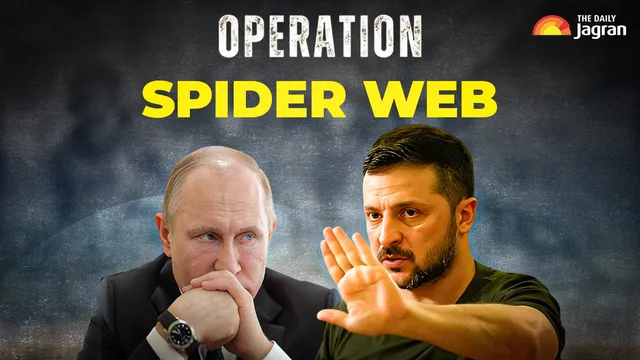- By Supratik Das
- Mon, 02 Jun 2025 01:06 PM (IST)
- Source:JND
In a bold and unprecedented action, Ukraine carried out its most extensive drone attack deep within Russian airspace, hitting five key airbases in a mission code-named Operation Spider's Web. The drone attacks, conducted on June 1, marked the most crucial turning point in the Russia-Ukraine war, a day before peace talks set to take place in Istanbul. According to Ukrainian President Volodymyr Zelenskyy, the attack was “a brilliant result,” and achieved “solely by Ukraine”, a message widely interpreted as a direct response to recent remarks made by US President Donald Trump about Ukraine’s reliance on Western support.
What Is Operation Spider's Web?
Operation Spider's Web is Ukraine's most extensive and best-coordinated drone strike operation to date, involving five high-value Russian airbases; Belaya, Dyagilevo, Ivanovo Severny, Olenya, and Ukrainka. The operation, said to have been in the planning stages for more than 18 months, was carefully planned and carried out by the Security Service (SBU) of Ukraine in coordination with other countries' security agencies. Zelenskyy verified that the operation only took one year, six months, and nine days from planning to implementation. It hit at the heart of Russia's strategic bomber force, destroying oa minimum of 41 warplanes, including Tu-95, Tu-22M bombers, and A-50 early warning and control planes.
How Ukraine Executed Operation Spider's Web
Contrary to earlier direct drone attacks launched from Ukrainian territory, this operation employed a much more covert approach
• Drones were smuggled into Russia hidden in wooden structures mounted on trucks, which were then parked close to the boundaries of Russian airbases.
• The structures were constructed like regular wooden cabins and had remotely operated rooftops that could open to deploy the drones.
• On command, 117 FPV (First-Person View) drones, each equipped with explosives, flew out from these secret platforms and hit military targets.
The tactic enabled Ukraine to circumvent Russia's advanced radar and air defense systems, catching Moscow entirely by surprise.
Ukraine Reports Huge Russian Losses
Ukraine's SBU reports that the operation resulted in 7 billion USD in damage to Russian military equipment. Officials said 34% of Russia's strategic aviation fleet had been damaged. The scope of the devastation includes long-range bombers reportedly used to conduct air raids on Ukrainian cities. Russia's defense ministry conceded that air bases throughout Murmansk, Irkutsk, Ivanovo, Ryazan, and Amur regions were struck. Though it has not released any specific figures regarding aircraft losses, only confirmed that “some planes caught fire.” In a tweet after the strike, Zelenskyy thanked the operation for its accuracy and scope, confirming Ukraine's sovereignty in performing such a complicated operation. "This is an achievement entirely done by Ukraine," he posted on X (formerly Twitter), emphasizing the nation's capability to protect itself without depending solely on Western military aid. He further disclosed that the operations team of Ukraine was stationed close to Russia's FSB headquarters in where they planned, highlighting the extent of the infiltration capabilities of Ukraine.
ALSO READ: Railway Bridge Collapses In Kursk: Second Train Derailment In Russia In 24 Hours
Hours before Ukraine initiated Operation Spider's Web, a Russian missile attack using an Iskander-M missile killed 12 Ukrainian troops and wounded more than 60 at a military base in Dnipropetrovsk. In the wake of the disaster, Ukrainian land forces' Major General Mykhailo Drapatyi resigned on grounds of moral responsibility.
The timing of the operation was strategic too, It came just before the second round of peace talks between Russia and Ukraine, scheduled in Istanbul on June 2. Ukraine's demonstration of military might is likely aimed at securing leverage at the negotiating table. In a late-night speech, Zelenskyy reiterated Ukraine's call for a "full and unconditional ceasefire" and accused Russia of withholding its memorandum detailing peace terms. "The Ukrainian offer is rational and realistic," he noted, adding that Moscow has not yet presented any formal document to Ukraine or its allies. Operation Spider's Web showcases a remarkable transformation in Ukraine's military prowess, especially in drone warfare, while Russia stumbles from the surprise attack. The success of the operation has the potential to reshape the war and the peace negotiations that follow.

